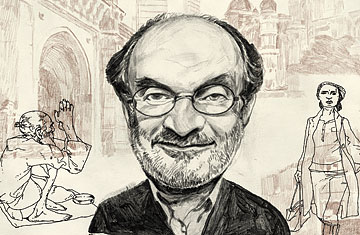
(2 of 2)
Mumbai, for Rushdie, was London's mongrel twin. "I had a Christian ayah (nanny), for whom at Christmas we would put up a tree and sing carols about baby Jesus without feeling in the least ill-at-ease," Rushdie wrote in 1985. "My friends were Hindus, Sikhs, Parsis, and none of this struck me as being particularly important." Nostalgia for that life permeates The Satanic Verses, which looks back at Mumbai with the trembling infatuation of the long-gone returned.
Narrow and Narrower
Subhash Desai remembers a very different Mumbai. He grew up in the 1950s in a neighborhood built around a former cotton mill on the far outskirts of the city. "On the eastern part, there was a creek, there were mangroves," Desai says. Weekends meant a trip into town to the beach at Juhu or Chowpatty. The traders and merchants who built the city gave way to industrialists and small manufacturing, attracting millions of migrant laborers seeking jobs. In 1961, the population was 4.1 million; since then it has quadrupled. Desai, a leader of the Shiv Sena, represents the suburb of Goregaon in the state assembly and supports closing Mumbai to new migrants. "People mindlessly continued to come here and settle," without any thought to where they would live or how they would get water or electricity, he says. "The city has virtually collapsed."
Rushdie wrote The Satanic Verses just as the Shiv Sena was coming into its first flush of power, having successfully yoked its original nativist message — reserving jobs and housing for locals — to the BJP's Hindu nationalism. In 1989, the Shiv Sena won its first seat in Parliament, and the BJP won 85, the first time the two parties made a significant national impact. Rushdie satirizes the Hindu right throughout The Satanic Verses, as well as in his later books, holding up his gorgeous hybrid city as an alternative. Desai dismisses that notion as fantasy. The sophisticated, glamorous city of Rushdie's imagination, he says, exists only in the posh high-rises of its southern tip. "There only Salman Rushdie's dream of sweet Mumbai can be seen."
For Muslims who do not belong to Rushdie's South Mumbai élite, the alternative to Hindu nationalist orthodoxy is not Rushdie's openness. It is India's inclusive, essentially conservative ideal, in which every community has the space to follow its own traditions, but the price of that freedom is the responsibility not to offend. That is why The Satanic Verses was rejected by the Muslims of Mumbai, who otherwise had little in common with the extreme views of Iran's ayatullahs. They had a different notion of cosmopolitanism, in which the freedom of the individual was less important than what bound communities into one harmonious whole.
Back to the Future
That emphasis on accommodation, on getting along, makes the 1989 violence in Mumbai even more baffling. The full story of what happened that day is not widely known, but it is well told in an April 1989 report by the Committee for the Protection of Democratic Rights, a panel of lawyers, academics and journalists. None of the large, established Muslim civic organizations in the city supported the Feb. 24 protest march, and those who did protest actually agreed with the Indian government's ban on the book. Their anger was directed at Rushdie and Britain, not at the Indian authorities. "The police acted wrongly at every turn," the committee concluded, substituting force for common sense and good communication. "The entire incident left the Muslims extremely bitter with the government, the police and with their established leaders."
Their bitterness has only worsened over time. "The perception is there of discrimination by the police," says Sheikh Mateen, the general secretary of Jamaat-e-Islami Hind in Maharashtra, a proudly secular social-service group founded in 1941. Young Muslim men in Mumbai complain that they are constantly harassed by the police, he says, creating a toxic cycle of suspicion and distrust between them. The sense of being targeted by the state fuels the anger of the small minority of Indian Muslims who are radicalized, Mateen says. "If there is no justice, then there is frustration." After the Mumbai terrorist attacks of last year, concern about the marginalization and radicalization of Indian Muslims briefly resurfaced. But once that attack was linked to Pakistan, India turned its attention elsewhere.
Perhaps the greatest irony of the controversy is that India is both more and less open to the book than it was 20 years ago. The Satanic Verses is freely available in India. But the book remains officially banned, and India's political support for free expression remains limited. Taslima Nasreen, a writer who took refuge in India when she was threatened in her native Bangladesh, was forced to leave last year; the Indian artist M.F. Husain has lived in exile for years, denounced by the Hindu nationalist right wing for his nude paintings of gods and goddesses. "It seems like these days India has lost sight of the fact that it's important to defend these imaginative freedoms," Rushdie said in a 2008 interview with the novelist Rana Dasgupta in Kolkata's Telegraph newspaper. "Without that, all this kind of modernizing, job-creating, triumphal India really doesn't mean anything." Rushdie, like so many outsiders to India, assumed that the country would pick up cosmopolitanism as easily as it did the imported soaps and chocolates now sold in Crawford Market. It didn't happen. In that sense, E.M. Forster's London is as distant from Salman Rushdie's Mumbai as ever.